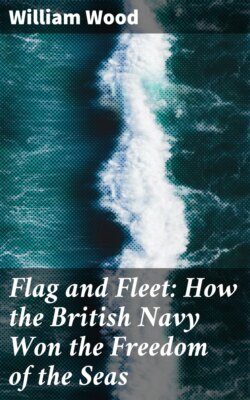Читать книгу Flag and Fleet: How the British Navy Won the Freedom of the Seas - William Wood - Страница 35
На сайте Литреса книга снята с продажи.
KING OF THE ENGLISH SEA
(1545)
ОглавлениеTable of Contents
England needed good pilots to take the ship of state safely through the troubled waters of the wonderful sixteenth century, and she found them in the three great Royal Tudors: Henry VII (1485–1509), Henry VIII (1509–1547), and Queen Elizabeth (1558–1603). All three fostered English sea-power, both for trade and war, and helped to start the modern Royal Navy on a career of world-wide victory such as no other fighting service has ever equalled, not even the Roman Army in the palmy days of Rome. It was a happy thought that gave the name of Queen Elizabeth to the flagship on board of which the British Commander-in-chief received the surrender of the German Fleet. Ten generations had passed away between this surrender in 1918 and the defeat of the Spanish Armada in 1588. But the British Royal Navy was still the same: in sea-sense, spirit, training, and surpassing skill.
Henry VII was himself an oversea trader, and a very good one too. He built ships and let them out to traders at a handsome profit for himself besides trading with them on his own account. But he was never so foolish as to think that peaceful trade could go on without a fighting navy to protect it. So he built men-of-war; though he used these for trade as well. Men-of-war built specially for fighting were of course much better in a battle than any mere merchantman could be. But in those days, and for some time after, merchantmen went about well armed and often joined the king's ships of the Royal Navy during war, as many of them did against the Germans in our own day.
English oversea trade was carried on with the whole of Europe, with Asia Minor, and with the North of Africa. Canyng, a merchant prince of Bristol, employed a hundred shipwrights and eight hundred seamen. He sent his ships to Iceland, the Baltic, and all through the Mediterranean. But the London merchants were more important still; and the king was the most important man of all. He had his watchful eye on the fishing fleet of Iceland, which was then as important as the fleet of Newfoundland became later on. He watched the Baltic trade in timber and the Flanders trade in wool. He watched the Hansa Towns of northern Germany, then second only to Venice itself as the greatest trading centre of the world. And he had his English consuls in Italy as early as 1485, the first year of his reign.
One day Columbus sent his brother to see if the king would help him to find the New World. But Henry VII was a man who looked long and cautiously before he leaped; and even then he only leaped when he saw where he would land. So Columbus went to Ferdinand and Isabella of Spain, who sent him out to discover America in 1492, the same year that they conquered the last Eastern possession in Western Europe, the Moorish Kingdom of Grenada, which thenceforth became a province of Spain. Five years later Henry sent John Cabot out from Bristol in the little Matthew with only eighteen men "to sayle to all Partes, Countreys, and Seas, of the East, of the West, and of the North; to seeke out, discover, and finde, whatsoever Iles, Countreyes, Regions, or Provinces, of the Heathennes and Infidelles" and "to set up Our banners and Ensigns in every village, towne, castel, yle, or maine lande, of them newly found." Cabot discovered Canada by reaching Cape Breton in 1497, three years before Columbus himself saw any part of the mainland. But as he found nobody there, not even "Heathenries and Infidelles," much less "villages, castels, and townes," as he lost money by his venture and could not pay the king the promised "royalty" of twenty per cent., we need not laugh too loudly over what the king gave him: "To Hym that founde the new Isle—10 pounds," which was worth more than a thousand dollars would be now. Cabot went again and his son Sebastian after him; but there was no money to be made in this venture. True, Sebastian said the fish off Newfoundland were so thick that he could hardly force his vessels through the water. But fish stories and travellers' tales were as hard to believe then as now; and the English thought America was worth very little after all. Indeed, the general opinion in Europe was that America was more of a nuisance than anything else, because it seemed to block the way to the Golden East. Once people were persuaded that the world was round they wanted to find a short cut to Cathay, the land of fabled wealth in silks and spices, gold and jewels; and they expected to find it by sailing due West till they reached the Far East. So, finding instead that America had no such riches on its own shores and that these shores spoilt the short cut to Cathay, and knowing that fish were plentiful in Europe, most people never bothered their heads about America for another fifty years.
